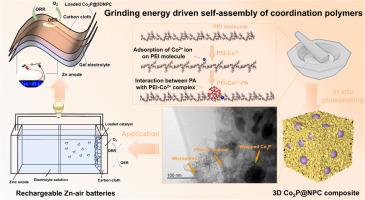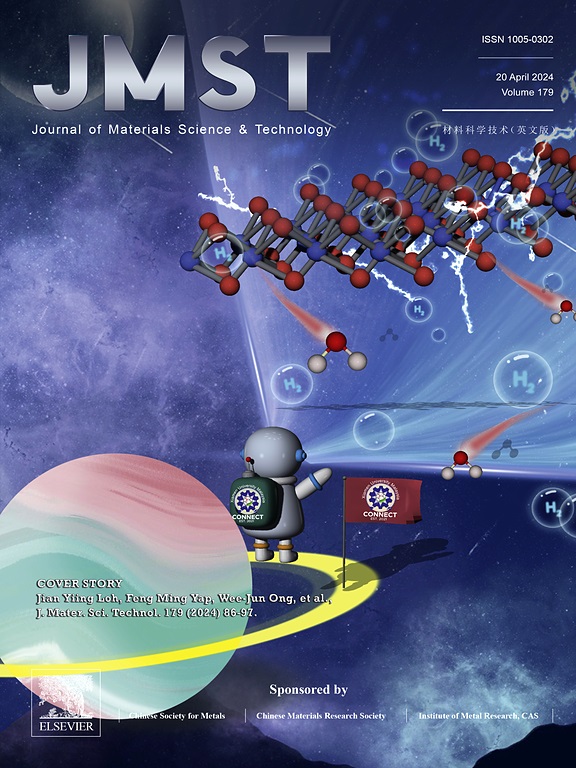Coordination polymer derived transition metal phosphide/carbon composites for bifunctional oxygen electrocatalyst
IF 11.2
1区 材料科学
Q1 MATERIALS SCIENCE, MULTIDISCIPLINARY
引用次数: 0
Abstract
Developing nonprecious electrocatalysts with bifunctional performances for oxygen reduction (ORR) and evolution reactions (OER) remains a crucial challenge in rechargeable Zn-air batteries (RZABs). In this study, we report the synthesis of a three-dimensional (3D) porous N, P-doped carbon-wrapped cobalt phosphide composite (Co2P@3DNPC) via direct calcination of a novel organic/inorganic porous coordination polymer by an in-situ phosphating strategy. DFT calculations demonstrate the intricate interactions occurring during the PEI-directed grinding self-assembly process among Co2+, phytic acid (PA), and polyethylenimine (PEI). Specifically, Co2+ ions initially adsorb onto PEI molecules before integrating with PA to form a 3D coordination polymer matrix. As-fabricated Co2P@3DNPC composite exhibits impressive ORR/OER bifunctional performances, with a half-wave potential of 0.78 V and an overpotential of 1.71 V, respectively. Its bifunctional activities enable a power density of 148.5 mW cm–2 in rechargeable ZABs, with remarkable stability (> 480 h) during a discharge-charge cycle. The interconnected porous structure and embedded Co2P nanoparticles optimize the electrode-electrolyte interfacial contact, boosting energy density and cycle life of as-assembled ZABs. This innovative approach paves the way for efficient, cost-effective production of bifunctional electrocatalysts for RZABs.

用于双功能氧电催化剂的配位聚合物衍生过渡金属磷化物/碳复合材料
开发具有氧气还原(ORR)和进化反应(OER)双功能性能的非贵金属电催化剂仍然是可充电锌-空气电池(RZAB)面临的一项重要挑战。在本研究中,我们报告了通过原位磷化策略直接煅烧新型有机/无机多孔配位聚合物合成三维(3D)多孔 N、P 掺杂碳包裹磷化钴复合材料(Co2P@3DNPC)的过程。DFT 计算表明,在 PEI 引导的研磨自组装过程中,Co2+、植酸(PA)和聚乙烯亚胺(PEI)之间发生了错综复杂的相互作用。具体来说,Co2+ 离子最初吸附在 PEI 分子上,然后与 PA 结合形成三维配位聚合物基质。经 As 制备的 Co2P@3DNPC 复合材料具有令人印象深刻的 ORR/OER 双功能性能,其半波电位和过电位分别为 0.78 V 和 1.71 V。它的双功能活性使可充电 ZAB 的功率密度达到 148.5 mW cm-2,并且在放电-充电周期内具有显著的稳定性(480 h)。相互连接的多孔结构和嵌入式 Co2P 纳米粒子优化了电极-电解质界面接触,提高了组装后 ZAB 的能量密度和循环寿命。这种创新方法为高效、经济地生产 RZAB 双功能电催化剂铺平了道路。
本文章由计算机程序翻译,如有差异,请以英文原文为准。
求助全文
约1分钟内获得全文
求助全文
来源期刊

Journal of Materials Science & Technology
工程技术-材料科学:综合
CiteScore
20.00
自引率
11.00%
发文量
995
审稿时长
13 days
期刊介绍:
Journal of Materials Science & Technology strives to promote global collaboration in the field of materials science and technology. It primarily publishes original research papers, invited review articles, letters, research notes, and summaries of scientific achievements. The journal covers a wide range of materials science and technology topics, including metallic materials, inorganic nonmetallic materials, and composite materials.
 求助内容:
求助内容: 应助结果提醒方式:
应助结果提醒方式:


